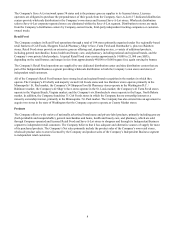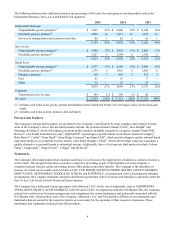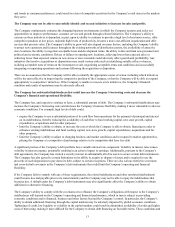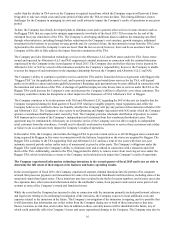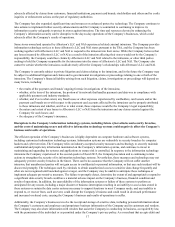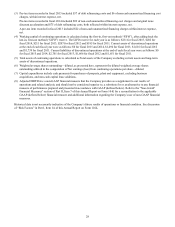Albertsons 2015 Annual Report Download - page 20
Download and view the complete annual report
Please find page 20 of the 2015 Albertsons annual report below. You can navigate through the pages in the report by either clicking on the pages listed below, or by using the keyword search tool below to find specific information within the annual report.18
credit cards for payment, the Company is subject to the Payment Card Industry Data Security Standard (“PCI DSS”), issued by
the PCI Council. PCI DSS contains compliance guidelines and standards with regard to the Company’s security surrounding the
physical and electronic storage, processing and transmission of individual cardholder data. By accepting debit cards for
payment, the Company is also subject to compliance with American National Standards Institute data encryption standards and
payment network security operating guidelines. As a result of the intrusions, the Company engaged a new third party security
firm to provide the Company a report on compliance with PCI DSS. This transition of security firms has delayed the
Company’s receipt of its report on PCI DSS compliance. Previously, a third party data security firm certified to the Company
that it was compliant with PCI DSS version 2.0; however, the Company is now required to comply with the new PCI DSS
version 3.0 and is currently engaged in the assessment process.
Despite any certifications and the utilization of other information security measures, the Company cannot be certain that all of
its IT systems or the IT systems of its vendors are or will be able to prevent, contain or detect any future cyber-attacks or
security breaches from known malware, malware that may be developed in the future or otherwise. Cyber-attacks are rapidly
evolving and becoming increasingly sophisticated and difficult to detect, and therefore, the Company may be unable to
anticipate these attacks or implement adequate preventive measures. Additionally, unauthorized parties may attempt to gain
access to the Company’s or a vendor’s systems or facilities through fraud, trickery or other forms of deception involving the
Company’s employees or vendors. To the extent that any attack or breach results in the loss, damage or misappropriation of
information, the Company may be adversely affected by claims from customers, financial institutions, payment card brands,
stockholders and others and by costly inquiries or enforcement actions on the part of regulatory authorities. The Company’s
operations could also be significantly disrupted by these claims, as well as by the need to spend significant time and expense to
upgrade, fix or replace its systems. The Company could also lose credibility with its customers and suffer damage to its
reputation and future sales. In addition, the cost of complying with stricter privacy and information security laws and standards,
including PCI DSS version 3.0, and developing, maintaining and upgrading technology systems to address future advances in
technology, could be significant and the Company could experience problems and interruptions associated with the
implementation of new or upgraded systems and technology or with maintenance or adequate support of existing systems.
Customers are increasingly using computers, tablets, mobile phones and other devices to shop in stores and online and provide
feedback and public commentary on their shopping experience, including prices. Multichannel retailing is rapidly evolving. If
the Company does not keep pace with changing customer expectations and new developments and technology investments by
its competitors, the Company’s ability to compete and results of operations could be adversely affected. In addition, if the
customer-facing technology systems do not reliably function as designed, the Company may experience a loss of customer
confidence or data security breaches or be exposed to fraudulent purchases, which, if significant, could adversely affect the
Company’s reputation and results of operations.
Worsening economic conditions could adversely impact consumer spending, increase costs of doing business or
otherwise adversely affect the Company’s operating results.
The vast majority of the Company’s store locations and customers are located in the United States, making its results highly
dependent on U.S. consumer confidence and spending habits. In recent years, the U.S. economy has experienced economic
recession, higher unemployment rates, higher energy costs, higher insurance and healthcare costs, a decline in the housing
market, and greater restrictions on the availability of credit, all of which contributed to suppressed consumer confidence and
increased price competition. While the U.S. economy and consumer confidence have improved recently, the sustainability of
these improvements remains uncertain and consumers have continued to trade down to a less expensive mix of products that
often yield lower margins and seek out discounters for grocery items. There can be no assurance that the Company will be able
to identify and respond to changes and trends in consumer spending and preferences and/or maintain the competitive position
of its operations. Additionally, these economic factors along with higher interest rates, costs of labor and tax rates, and other
changes in tax, healthcare and other laws and regulations, can increase the Company’s cost of sales and selling, general and
administrative expenses, and otherwise adversely affect the Company’s operating results. While economic conditions have
improved and are showing less signs of volatility, there is continued uncertainty. In addition, inflation continues to be
unpredictable; food deflation could reduce sales growth and earnings, while food inflation, combined with reduced consumer
spending, could reduce gross profit margins. If these consumer spending patterns continue or worsen, and the economy does
not continue to improve or it weakens, the Company’s financial condition and results of operations may be adversely affected.
The Company’s businesses are subject to laws and governmental regulations that could adversely impact the
Company’s financial condition and results of operations.
The Company’s businesses are subject to various federal, state and local laws, regulations and administrative practices. These
laws require the Company to comply with numerous provisions regulating health and sanitation standards, food safety,
marketing of natural or organically produced food, facilities, environmental, equal employment opportunity, public


